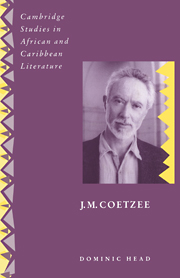Book contents
- Frontmatter
- Contents
- Preface
- List of abbreviations
- Chronology
- 1 The writer's place: Coetzee and postcolonial literature
- 2 Writing violence: Dusklands
- 3 The wrong kind of love: In the Heart of the Country
- 4 An ethical awakening: Waiting for the Barbarians
- 5 Gardening as resistance: Life and Times of Michael K
- 6 The maze of doubting: Foe
- 7 A true confession: Age of Iron
- 8 Producing the demon: The Master of Petersburg
- Notes
- Select bibliography
- Index
2 - Writing violence: Dusklands
Published online by Cambridge University Press: 01 March 2010
- Frontmatter
- Contents
- Preface
- List of abbreviations
- Chronology
- 1 The writer's place: Coetzee and postcolonial literature
- 2 Writing violence: Dusklands
- 3 The wrong kind of love: In the Heart of the Country
- 4 An ethical awakening: Waiting for the Barbarians
- 5 Gardening as resistance: Life and Times of Michael K
- 6 The maze of doubting: Foe
- 7 A true confession: Age of Iron
- 8 Producing the demon: The Master of Petersburg
- Notes
- Select bibliography
- Index
Summary
It has become a truism in criticism of Coetzee that Dusklands (1974) introduces a new postmodernist strain in the novel from South Africa. Gordimer, it is true, is progressing towards a discursive self-consciousness at this time (notably in The Conservationist, also 1974); but Dusklands offers no mimetic representation of the South Africa with which it is contemporaneous: it also introduces the characteristic Coetzee style, in which an interrogation of the chosen narrative modes is an integral aspect of the fiction.
This interrogation, at one level, is straightforward, relating to different discourses of imperialism which are parodied in the novel. At another level, however, the interrogation becomes more complex, designating a reflexive self-critique which implicates the austerity of postmodernist expression itself (or at least the idea of this austerity). The impetus of this built-in critique is to anticipate a charge of moral failure, an absence of judgement on the horrors depicted. An incipient ethical stance emerges, often where a self-consciousness about discourse – postmodernism in caricature – is made to betray its own will-to-power.
The book is divided into two main sections (each with its own subsections), though it is probably wrong to speak of these two sections as separate novellas as their meaning is dependent upon their interrelationship, and the development of theme and motif. The first section, ‘The Vietnam Project’, details the collapse into insanity of its narrator, Eugene Dawn, writing an analysis of the psychological war in Vietnam for the US Defense Department.
- Type
- Chapter
- Information
- J. M. Coetzee , pp. 28 - 48Publisher: Cambridge University PressPrint publication year: 1998
- 1
- Cited by

